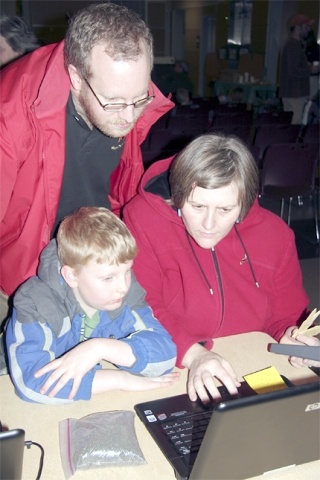When it’s time for the Thurston family of Snoqualmie to take young son Erik to karate lessons, the family usually drives the five blocks to the karate studio.
Last week’s Snoqualmie Going Green town meeting gave the Thurstons a chance to calculate the real value of that short drive, economically and environmentally.
Using a computer station provided by urban planning students from the University of Washington, parents Lorraine and Richard Thurston found out that five-block drive costs them about $3 a week. If they walk it, they could burn 788 calories a week.
For Lorraine, that walk equals “a spin class and a half.” Dad Richard joked that the walk could merit an extra serving of ice cream.
The Thurstons’ discoveries were among others made at the town hall event, hosted by the city of Snoqualmie and UW students.
Participants got a chance to take a live version of the online green awareness poll conducted in Snoqualmie this winter. They weighed in on topics from recycling and garbage collection to energy savings, local walking trails and the availability of public transportation. UW students compared some live questions with the online poll.
For example, two-thirds of residents at the town hall meeting Thursday said they wanted to see more trails in the community, while less than half gave that response in the online poll.
Results from the survey are helping the city of Snoqualmie plan future green initiatives.
Representatives from King County, Puget Sound Energy and the city were on hand to share information on how people can save energy in the home, compost and recycle, use recycled fertilizer, and get smaller garbage cans.
“Right now, we’re trying to walk our talk before we go preaching to the community,” Snoqualmie mayor Matt Larson said.
Snoqualmie resident Josh Hearetig talked of the important of a kilowatt-meter in measuring wasted energy in the home. The real surprises, he said, were the things that you’d never think of: how much energy is used by the refrigerator, or by devices that are technically “off.”
Snoqualmie councilman Bob Jeans shared his experience with a Puget Sound Energy pilot program that replaced all the lights in his house with LEDs, or light emitting diodes. He was pleased with the results.
Snoqualmie resident Trapper Bailey raised concerns for the future about downtown parking. His residence has on-street parking. He’d like to see a charging station for a hybrid, but wonders how he could charge a vehicle without a dedicated parking space.
Coming away from the meeting, the Thurston family were interested in the smaller, 20-gallon garbage cans. They were provided 32-gallon buckets by the company, but would like to see smaller ones provided free instead.
Snoqualmie Public Works Operations Manager Mike Roy said the city is working on getting new container options for residents in the next round of negotiations with Allied Waste. The current contract is up in 2012.



